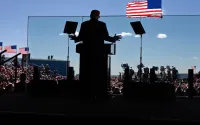Noam Chomsky on Iraq Troop Withdrawal, Haiti, Democracy in Latin America and the Israeli Elections
3 April 2006Democracy Now!
We turn now to Part II of our interview with Noam Chomsky. The world-renowned linguist and political analyst has just come out with a new book. It's called "Failed States: The Abuse of Power and the Assault on Democracy." In his first broadcast interview upon the book's publication, Chomsky spoke to us from our Boston studio Friday. In this second part of our conversation, Chomsky discusses a wide range of issues that are making headlines today -- including troop withdrawal from Iraq; the growing rejection of US policies in Latin America; the upheaval in Haiti; and last week's elections in Israel. We began by talking about dissent and media control in the United States today.
Noam Chomsky, world renowned political analyst and professor of linguistics and philosophy at the Massachusetts Institute of Technology. He is author of dozens of books, his latest is "Failed States: The Abuse of Power and the Assault on Democracy."
AMY GOODMAN: In his first broadcast interview upon the book's publication, Chomsky spoke to us from our Boston studio on Friday.
JUAN GONZALEZ: With public opposition to the Bush administration's policies at record highs, I asked Professor Chomsky to talk about how it is that so much discontent with the government has not translated into larger political mobilization.
NOAM CHOMSKY: First of all, on the fact that advertising is designed to undermine free markets, that everybody knows, anyone who's ever looked at a television ad. According to what you're taught in economics courses, our system is based on free markets with entrepreneurial initiative and rational choices by informed consumers. Well, the reality is radically different. A tremendous amount of the entrepreneurial initiative, if you want to call it that, comes from the dynamic state sector on which most of the economy relies to socialize costs and risks and privatize eventual profit. And that's achieved by, if you like, advertising. So, it's presented under the rubric of defense or some other pretext, but it's essentially a way for the public to pay the costs of research and development, take the risks and eventually hand over the profit. There's some entrepreneurial initiative, but not all that much, mostly at the marketing end.
As far as consumers are concerned, I mean, when you look at a television ad, it is not trying to create an informed consumer who's going to make a rational choice. We all know that. If they were going to do that, General Motors would just list the characteristics of its models and, you know, you're over, you're done. The purpose is to delude and deceive by imagery -- it's transparent -- meaning to ensure that uninformed consumers will make irrational choices.
And that goes straight to the democratic deficit. The U.S. does not have elections in a serious sense. It has advertising campaigns, run by the same industries that sell toothpaste: public relations industry. When they're selling candidates, they don't tell you -- provide you with information about them, any more than they do about lifestyle drugs or cars. What they do is create imagery to delude and deceive. That's what's called an electoral campaign. The result is that people are just unaware of the stands of candidates on issues.
So to take one critical example, take, say, the Kyoto Protocols. I mean, they're not the be all and end all, but environmental catastrophe is a serious matter. The public is strongly in favor of the Kyoto Protocols, so strongly in favor that a majority of Bush voters -- Bush voters -- thought that he was in favor of it. They are simply unaware. And it's not because of mental incapacity or a lack of interest. It's because that's the way campaigns are presented. They're presented to keep issues off the agenda. Striking cases.
Take, say, healthcare, one of the worst domestic problem -- most serious domestic problems; for most people, a major problem. I mean, it's the most inefficient healthcare system in the world, double the per capita cost of other comparable countries, some of the worst health outcomes, mainly because it is privatized. The public is strongly against it. For a long period the public has been in favor of some kind of national healthcare system.
Well, you know, Kerry is supposed to be the candidate of, you know -- speaking for whose constituency calls for social spending, and so on and so forth. The last presidential debate, a couple days before the election, was on domestic issues. And the New York Times had an accurate account of it. It described it as -- it pointed out that Kerry made no mention of any government involvement in any healthcare system. And the reason, according to the Times reporter, is that the idea lacks political support, meaning it only has the support of the overwhelming majority of the population, but it's opposed by the pharmaceutical corporations, the insurance industry, and so on. That's what counts as political support. So Kerry didn't mention it, and the public didn't know his stand on these issues. And so it goes issue after issue. So, these are not real elections. We'd laugh at them, and they were some third world country.
Now, take the war in Iraq. When you talk about the government propaganda system we have to recognize that that includes the media. It includes the media, the journalists and so on. That's all part of the propaganda system, very closely linked. There is virtually no criticism of the war in Iraq. Now, that will surprise journalists, I suppose. They think they're being very critical, but they're not. I mean, the kinds of criticism of the war in Iraq that are allowed in the doctrinal system, media and so on, are the kind of criticisms you heard about, say, in the German general staff after Stalingrad: it's not working; it's costing too much; we made a mistake, we should get a different general; something like that. In fact, it's about at the level of a high school newspaper cheering the local football team. You don't ask, "Should they win?" You ask, "How are we doing?" You know, "Did the coaches make a mistake? Should we try something else?" That's called criticism.
But there's a critical question: What right does the U.S. have to invade another country, in gross violation of international law, understanding that it's probably going to increase the threat of terror and nuclear proliferation? But just, you know, it's a supreme international crime, in the words of the Nuremburg Tribunal, for which German leaders were hanged. You know, the issue isn't how they are going to win, it's "What are they doing there in the first place?"
AMY GOODMAN: Do you believe, Noam Chomsky, in immediate withdrawal, that the troops should withdraw immediately?
NOAM CHOMSKY: I think we should estab-- there is a certain principle that we should adhere to. The principle is that invading armies have no rights whatsoever. They have responsibilities. The prime responsibility is to heed the will of the victims and to pay massive reparations to the victims for the crimes they've committed. In this case, the crimes go back through the sanctions which were a monstrous crime, through the support for Saddam Hussein, right through his worst atrocities, but particularly, those of the invasion. Those are the two responsibilities of an occupying army.
Well, you know, the population has made it pretty clear. Even U.S. and British polls make that clear. Overwhelming majorities want the U.S. to set a timetable to withdraw and adhere to it. Britain and the United States refuse. Reparations, we can't even talk about; that's so far from consciousness in the doctrinal system. Well, I think that answers the question. Doesn't really matter what I think. What matters is what Iraqis think, and I think we know that pretty well. The reason the U.S. and Britain aren't withdrawing are those I mentioned. You know, the consequences of independence for Iraq would be an ultimate nightmare for them. And they're going to try to do anything they can to prevent Iraqi democracy, as they've been trying in the past.
AMY GOODMAN: And the argument that they will just descend into civil war and that the sectarian violence will increase, and the U.S. went in and now has a responsibility not the leave a mess?
NOAM CHOMSKY: Yeah, I mean, the Germans could have given the same argument and occupied Europe, the Russians in the satellites, the Japanese in Asia, and so on. Yeah, they could have all given the same argue: well, we went in, and now we have a responsibility to ensure that terrible things don't happen, and so on. And the argument had some validity. So, when the Germans were driven out of France, let's say, there were thousands, maybe tens of thousands of people killed by -- as collaborators, and in Asia, even more so. But is that an argument for them? No. It's none of their business.
We don't know what will happen, and it's not our decision to make. It's the decision of the victims to make, not our decision. Occupying armies have no right to make the decision. We could have an academic seminar about it, in which we could discuss the likely consequences. But the point is it's not for us to say. Well, until that enters into the discussion, and the critical issues of the war, like what right do we have to invade in the first place, enter into the discussion, the media and the journalism and so on are simply part of the government propaganda system, as I say, like a high school newspaper or like Pravda during the Afghanistan war.
JUAN GONZALEZ: And what of the role of the American people in this process? Clearly, it seems to me that so much of the antiwar sentiments quickly gets channeled into one or another political candidates, rather than into continuing to build a mass movement that, regardless of the political folks in office, will move to extricate the United States from this invasion.
NOAM CHOMSKY: Yeah, you're absolutely right. But that's our problem. I mean, you cannot expect power centers , whether in the government or in the economic system or in the media, which are all closely linked. I mean, they aren't going to try to stimulate popular movements that will be critical of power and try to erode power. In fact, their task is the opposite. So, yes, this has to be done by a popular movement. I mean, that's the way every constructive change has taken place in the past. I mean, how did we get civil rights to the extent that they exist, minority rights, women's rights, the benefits system that does exist, and so on? I mean, these things are not gifts from above; they are won from below. And it's going to be the same on this.
AMY GOODMAN: Noam Chomsky, I was going to say, as you talk about popular movements, right now we are in the midst of a kind of groundswell that the -- certainly the U.S. English-speaking media has not dealt with before. And that is this massive level of grassroots protest against immigration policy in this country, some of them not just the largest protests on immigration, but some of the largest protests in the history of this country are taking place, with upwards of a million people protesting in the streets of Los Angeles, tens of thousands in Atlanta and Arizona, the biggest protest perhaps in the history of Chicago. What about this? The walkout of 40,000 high school students?
NOAM CHOMSKY: Well, these protests did have an effect. The bill that went through the Senate Judiciary Committee, to some extent, reflected them. Power centers cannot ignore public protests and, even worse from their point of view, continuing organization. You know, a demonstration now and then, okay, you can live with it. If it continues and becomes real grassroots organization, developing a functioning political system, in which people actually participate in forming and shaping policy and electing their own candidates, if it gets to that stage, they're in trouble. And we're far from that.
In fact, it's kind of -- it's terrible irony. We ought to be ashamed of it. But if you want to look for democratic elections in the Western hemisphere these days, you have to look at countries like Bolivia, not the United States. I mean, in Bolivia, they had a real election. It's the poorest country in South America. Last December, they had an election in which organized -- well-organized masses of the population -- poor people, indigenous people and others -- managed to elect a candidate from their own ranks. There were real serious issues, and people knew the issues. And they voted on the issues. That's dramatically different from here. That's real democracy. You want to talk about democracy promotion, we need it here, and we can learn lessons from them.
Actually, the same is true in Venezuela. Venezuela is bitterly denounced here by the government media propaganda system as totalitarian dictatorship, and so on and so forth. Well, you know, you can think what you like about Chavez -- not our business -- but the question is what do Venezuelans think about him. That's the question, if you believe in democracy. Well, we know the answer. During the Chavez years, support for the elected government has risen very sharply. It is now the highest in Latin America by a considerable margin. He's managed to win poll after -- election and referendum after election, one after another, about half a dozen, despite intense media opposition of a kind that you can't imagine here, and subversion by the superpower. After all, the U.S. supported a military coup to try to overthrow him, had to back down, partly because it was quickly reversed by popular action, but partly because of a swell of protest throughout Latin America, where they just don't have the same contempt for democracy as the leadership and the media do here and don't like the idea of democratically elected governments being overthrown by the military.
Since then, the U.S. has been dedicated to subversion. It's very probable that -- the last poll that I saw, a North American poll a couple of weeks ago, asked people who are they going to vote for in the next election. And I think it was about two-thirds said they'd vote for Chavez, and I think 4% for the next highest candidate. Well, in those circumstances, the U.S. is almost certain to turn to the standard operating procedure when you know you're going to lose an election: try to discredit it, by getting the opposition to boycott it.
JUAN GONZALEZ: Well, you'll be glad to know that when -- you mentioned Hugo Chavez -- when Amy and I interviewed him several months ago, he mentioned that his favorite American writer was Noam Chomsky, and he cited actually some of your books. So, I guess that we -- there ought to be a poll taken of how many leaders in the third world are reading Noam Chomsky, because you're obviously having an effect on many of these leaders.
NOAM CHOMSKY: I don't want to be self-serving, but I actually know quite a few examples.
AMY GOODMAN: What are the other ones, Noam?
NOAM CHOMSKY: Well, it's unfair to mention them.
AMY GOODMAN: Well, let me ask you --
NOAM CHOMSKY: They've got their own problems with the U.S. government.
AMY GOODMAN: Let me ask you about Haiti. How does this fit he the picture that you're talking about?
NOAM CHOMSKY: Well, I won't run through the whole story, but Haiti actually also had a democratic election, of a kind that should put us to shame. They had a real democratic election in 1990, again, like Bolivia. You know, massive grassroots organizations, poor people that nobody was paying any attention to, succeeded in electing their own candidate, to everyone's astonishment. Everyone assumed the U.S.-backed candidate representing the elites and the power centers would easily win. Well, he didn't. He got 14% of the vote. Very quickly, instantly, the U.S. moved to subvert the election -- instantly -- by what are called democracy promotion measures, meaning supporting the opposition. That's what U.S. Aid did, and so on, try to support anyone opposed to the government.
Other measures were taken. Pretty soon there's a military coup, led to years of vicious terror. Contrary to what people believe, the U.S. supported the coup. It continued to trade with the junta and rich elite increasingly under Clinton. Clinton actually authorized the Texaco Oil Company to provide oil to the junta and the elite, overriding formal presidential directives blocking it. Finally, the Clinton administration decided that the public had been tortured enough, sent in the Marines. That was called democracy promotion. However, as Allan Nairn right away pointed out, and others, Aristide was restored on the condition that he accept the policies of the defeated U.S. candidate in the 1990 election, harsh neo-liberal policies, which were bound to destroy the economy, as they did, led to turmoil, disaster, continuing U.S. subversion. Finally, the Bush administration blocked aid. More turmoil and confusion then came the -- by now, the country is kind of falling apart. You can go into the details.
But, finally, the U.S. and France simply intervened and removed the President. France was particularly infuriated, because Aristide had politely called upon France to do something about the crushing debt that had been imposed on Haiti back in 1825 as punishment for their having them -- for liberating themselves from France. They had been bearing this ever since, and naturally that infuriated France. How can the Haitians dare to say this? So, the U.S. and France basically kicked him out. Horrible atrocity since. Now, they're trying to reconstruct somehow. Again, we owe them enormous reparations, as does France, for the atrocities we have been carrying out there actually for over a century, after we took over the project of torturing Haitians from France. Is there any -- it's hard to know what the possibilities are. I mean, it's just -- I mean, the society has been really devastated. It's one of the poorest in the world.
AMY GOODMAN: And the latest of Aristide being taken out of Haiti, after he was re-elected -- this, of course, February 29, 2004, on a U.S. plane with U.S. military and security and sent to the Central African Republic?
NOAM CHOMSKY: Yeah, not only that, but the U.S. won't even allow him back into the region. I mean, it's essentially imprison-- insisted that he be imprisoned in South Africa. There was tremendous protest by the Caribbean countries over this. The candidate who won the election is the one who was closest to him; probably if he had been running, he would have won, but the U.S. would never allow that, and, as I say, won't even allow him into the region. Well, that's just another illustration of the near passionate hatred of democracy, which is consistent and is indeed recognized.
It's even recognized by the scholarship, of the most prestigious scholarship, by advocates of democracy promotion. They advocated, like Thomas Carothers, head of the Carnegie Endowment Project -- was the most respected -- he advocates it and says it's wonderful. But he also points out that the U.S. consistently had been opposed to it. There is what he calls a strong line of continuity in all administrations, namely, democracy is promoted if and only if it supports U.S. strategic and economic objectives. In Central America, for example, where he was particularly -- he was involved in the Reagan State Department. He says, yeah, the U.S. opposed democracy and the reason he says is the U.S. would tolerate only top-down forms of democratic structures, in which traditional elites allied to the United States would remain in power in highly undemocratic societies. Yeah, that's a kind of democracy promotion that we promote, that the administration preaches and that the press and journalists hail as magnificent. Again, this is kind of North Korea.
AMY GOODMAN: And another region, of course, back to Israel, the election of Kadima, the media characterizing Kadima as the centrist party that is going to do away with many of the settlements in the West Bank, and then the election of Hamas in the Occupied Territories. Your response?
NOAM CHOMSKY: Well, I would just urge anyone who wants to look into this to compare the lead editorial in the New York Times yesterday with the lead editorial yesterday in the world's leading business journal, the London Financial Times. They're diametrically opposed. The New York Times says it's wonderful Israelis agreed to withdraw from the West Bank. Of course, there is the little matter of borders, but they say that's of no importance. You know, minor issue, where the borders are. Yeah, no issue, except for the people who live there. That's the New York Times.
They do -- the Times reported the anguish of the settlers that'll have to leave. I mean, it's kind of as if the reporting has been -- as if, say, you know, I broke into your house, took over the whole house, finally agreed -- tortured you, you know, stole everything from you and so on, and then agreed to leave you the attic and the cellar, but keep the rest of the house. And it's -- I do that with great anguish, because I don't want to leave the attic. I kind of liked it. I mean, that's the way it's being reported. It's scandalous.
AMY GOODMAN: Noam Chomsky, world renowned linguist, political analyst, on the publication of his new book, Failed States.






